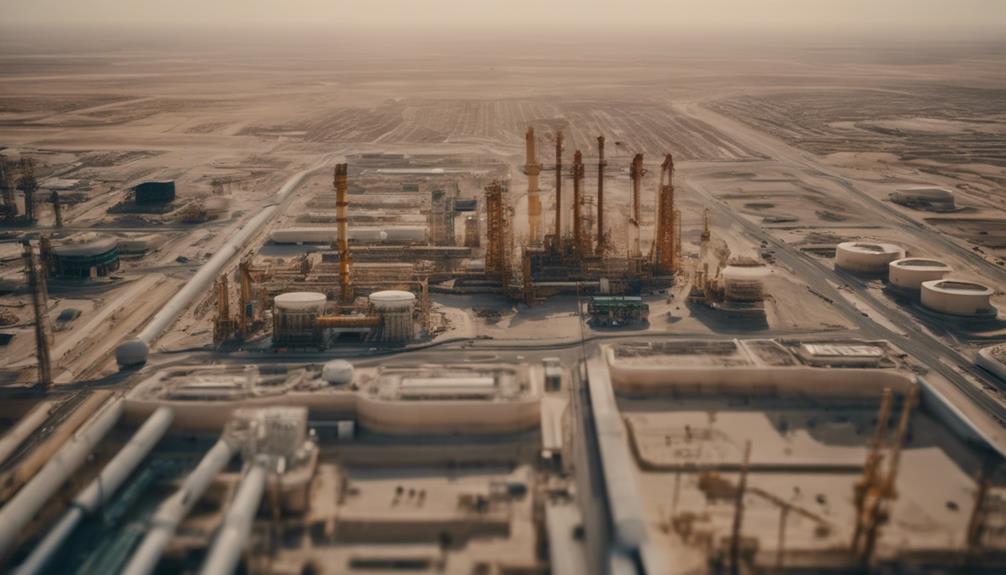The economic landscape of Saudi Arabia is undergoing a significant transformation with Vision 2030 at its helm. As the Kingdom diversifies its industries and explores new economic sectors, opportunities for investment are burgeoning.
Understanding the key economic sectors, potential growth prospects, and the intricate web of policies and initiatives shaping this evolution is crucial for any stakeholder. In this comprehensive guide, we will navigate through the intricate tapestry of economic development in the Kingdom of Saudi Arabia, offering insights that are essential for both seasoned investors and those looking to venture into this dynamic market.
Vision 2030: Transforming Kingdom of Saudi Arabia Economy

Vision 2030 aims to revolutionize the Saudi Arabian economy through diversification and modernization initiatives. One key strategy within this vision is the promotion of public-private partnerships (PPP) to drive economic growth and development. These partnerships involve collaboration between the government and private sector entities to fund, develop, and operate projects that benefit both parties and the economy as a whole. By leveraging the expertise and resources of both sectors, PPPs can help accelerate the implementation of key projects and initiatives outlined in Vision 2030.
Moreover, technology integration plays a crucial role in achieving the goals set forth by Vision 2030. Embracing technological advancements across various industries is essential for enhancing productivity, efficiency, and competitiveness. By investing in technology and fostering innovation, Saudi Arabia can position itself as a leader in the digital economy and attract foreign investment. Through strategic partnerships and a strong focus on technology integration, Vision 2030 aims to transform the Saudi economy into a diversified, knowledge-based economy that is well-equipped to thrive in the modern global marketplace.
Diversification of Industries
The evolution of Saudi Arabia’s economic landscape is intricately linked to the strategic diversification of industries within the nation. Industrial expansion and technological innovation play pivotal roles in this transformation. By diversifying its industries, Saudi Arabia aims to reduce its dependence on oil revenues and establish a more resilient and sustainable economy. This strategic shift not only mitigates the risks associated with fluctuating oil prices but also opens up new avenues for economic growth and development.
One of the key benefits of industrial diversification is job creation. By expanding into new sectors such as manufacturing, technology, tourism, and healthcare, Saudi Arabia can generate employment opportunities for its growing population, thereby reducing unemployment rates and fostering social stability. Additionally, diversifying industries enhances the nation’s global competitiveness by enabling it to tap into emerging markets, attract foreign investment, and foster innovation. Through strategic planning and investments in key sectors, Saudi Arabia is positioning itself as a dynamic and diversified economy ready to face the challenges of the 21st century.
Key Economic Sectors

Amidst the ongoing diversification of industries in Saudi Arabia, an examination of the key economic sectors reveals the strategic focus and potential for growth in various non-oil sectors. The energy sector stands out as a vital component of the Saudi economy, with initiatives aimed at increasing efficiency and sustainability through technology innovation. By investing in renewable energy sources and optimizing traditional energy production, Saudi Arabia aims to secure its energy future.
Tourism development is another key sector experiencing significant attention. The Kingdom is leveraging its historical and cultural sites to attract international visitors, with a particular focus on enhancing hospitality services and infrastructure. This sector shows promise for substantial growth and job creation in the coming years.
Agriculture modernization is also a priority, with initiatives to increase domestic food production and reduce reliance on imports. Through the integration of modern farming techniques and technology, Saudi Arabia aims to enhance food security and boost agricultural exports. These key economic sectors demonstrate the Kingdom’s commitment to diversifying its economy and fostering sustainable growth beyond oil revenues.
Investment Opportunities
With the evolving economic landscape in Saudi Arabia, notable investment opportunities are emerging across various sectors. One prominent avenue for investment is through foreign partnerships, as the Kingdom continues to open up its economy to foreign investors. Saudi Arabia’s Vision 2030 initiative has paved the way for increased foreign direct investment, offering attractive incentives and opportunities for international collaboration. Foreign partnerships can bring in expertise, technology, and capital to drive growth in sectors such as energy, healthcare, tourism, and manufacturing.
Another significant area offering investment opportunities in Saudi Arabia is infrastructure development. The government has allocated substantial funds for infrastructure projects aimed at enhancing the country’s transportation networks, energy facilities, housing, and industrial zones. Investors can participate in these projects through public-private partnerships or direct investments, benefiting from the country’s strategic location and ambitious development plans. The emphasis on infrastructure development presents a promising prospect for investors looking to capitalize on the Kingdom’s growth trajectory and contribute to its economic diversification efforts.
Future Growth Prospects

As Saudi Arabia continues to attract foreign investments and bolster its infrastructure, the country’s future growth prospects are poised for significant expansion across various sectors. Technology innovation plays a crucial role in shaping Saudi Arabia’s economic landscape. The country has been actively investing in digital transformation, fostering a conducive environment for tech startups and attracting global tech giants to establish a presence in the region. This focus on technology is expected to drive efficiency, productivity, and competitiveness across industries, propelling Saudi Arabia towards becoming a regional tech hub.
Moreover, infrastructure development remains a key priority for Saudi Arabia’s growth trajectory. The kingdom’s ambitious infrastructure projects, such as NEOM, the Red Sea Project, and Qiddiya, are set to transform the nation’s economic outlook. These mega-projects not only create employment opportunities but also enhance the country’s tourism, entertainment, and industrial sectors. By investing in cutting-edge infrastructure, Saudi Arabia is laying the foundation for sustainable economic growth and diversification, ensuring a prosperous future for generations to come.
Frequently Asked Questions
What Are the Specific Challenges Faced by Saudi Arabia in Achieving Its Economic Development Goals Outlined in Vision 2030?
In pursuit of achieving its economic development goals outlined in Vision 2030, Saudi Arabia faces challenges such as diversifying its economy, promoting gender equality, and fostering workforce diversity. Strategic planning and implementation are crucial to overcoming these hurdles.
How Does Saudi Arabia Plan to Address Issues Related to Gender Inequality and Workforce Diversity in Its Economic Diversification Efforts?
Saudi Arabia aims to enhance gender equality and workforce diversity in its economic diversification endeavors through strategic policies, programs, and initiatives. By promoting inclusivity, equal opportunities, and supportive environments, the Kingdom strives to create a more dynamic and progressive economy.
What Role Does Technology and Innovation Play in the Diversification of Industries in Saudi Arabia?
Technology and innovation are integral in the diversification of industries in Saudi Arabia. These advancements enhance productivity, create new opportunities, and drive economic growth. By leveraging these tools, the Kingdom can transform traditional sectors and boost competitiveness on a global scale.
Are There Any Specific Environmental Sustainability Initiatives Incorporated Into the Key Economic Sectors Identified by the Saudi Government?
Environmental sustainability initiatives are crucial in fostering economic growth through sustainable development. Key economic sectors in Saudi Arabia have incorporated green initiatives to mitigate environmental impact and promote long-term sustainability, aligning with global efforts towards a greener economy.
How Does Saudi Arabia Plan to Attract Foreign Direct Investment and Promote Entrepreneurship in Order to Capitalize on Its Investment Opportunities?
Saudi Arabia plans to attract foreign investment by offering strategic incentives, streamlined regulations, and economic diversification. Entrepreneurship promotion includes fostering innovation hubs, mentorship programs, and funding initiatives. These efforts aim to capitalize on investment opportunities and drive economic growth.
Conclusion
In conclusion, the economic development in the Kingdom of Saudi Arabia is undergoing a significant transformation through Vision 2030.
The diversification of industries and focus on key economic sectors have opened up numerous investment opportunities for both domestic and international investors.
The future growth prospects for the Saudi economy look promising as the country continues to implement reforms and initiatives to drive sustainable economic development.








